After a flood wiped out Bexy Guerrero Salmiento’s home in 2013, her husband disappeared. Just days earlier, Manuel, Bexy and their five children had fled the wreckage of their washed-out home in Manta, a port city of 200,000 in Ecuador, to seek shelter with relatives. Then Manuel left on a fishing trip to earn money to rebuild their home. He never came back.
For months Bexy searched frantically for clues to Manuel’s disappearance. Perhaps his small boat had sunk in the rough seas. Perhaps he had fallen prey to the pirates who prowl the water stealing boat motors, leaving fishermen stranded miles from shore. Neighbors advised Bexy to move on. Her husband was surely dead.
Then, eight months after Manuel had gone missing, Bexy’s phone rang.
“Mi amor, perdoname [My love, I’m sorry],” said a man. Through the static, Bexy barely recognized her husband’s voice. Her heart stopped.
“You won’t believe this,” Manuel said. “But I’m in the United States. In prison.”
During the day, through scorching sun and pounding rain, the detainees were chained on deck, fed little and made to defecate in buckets. At night, they were shackled below deck.
Before the call dropped, Bexy learned the hazardous details of Manuel’s journey. Desperate to find money to rebuild their home, he had agreed to transport cocaine to the US in his boat. Colombian drug smugglers had promised him $10,000 for the two-week trip.
Manuel had sailed to Colombia with two other men to pick up the cargo before heading out to sea. But the US Coast Guard, which patrols the Pacific coasts of Central and South America, intercepted his boat off the coast of Guatemala and captured the men.
For four months, Manuel was held on board the Coast Guard ship as it crawled slowly to the United States, picking up human cargo as it went.
During the day, through scorching sun and pounding rain, the detainees were chained on deck, fed little and made to defecate in buckets. At night, they were shackled below deck, tossed about in the belly of the boat. By the time the ship made land in Florida, Manuel had lost all sense of time.
In Florida, federal prosecutors charged Manuel and his co-defendants with attempting to smuggle cocaine into the United States. They sentenced him to 14 years in prison.
***
Six years after Manuel’s capture, I met Bexy near her home in Manta. We gathered in a neighbor’s living room along with a dozen other women who have a husband or son serving time in the United States for drug-law violations. Over the past several years, the US Coast Guard has picked up hundreds of Ecuadorian fishermen and imprisoned them in the United States.
The Maritime Drug Enforcement Act, enacted in 2006, declares it a crime against the United States to transport drugs in international waters—even without proof that the boats are headed to the US. The US has signed agreements with dozens of countries, including Ecuador, that allow US officials to board foreign vessels, detain suspected smugglers and prosecute them in the United States.
I met with a dozen women in Manta with incarcerated loved ones. But their support group numbers over 200.
At first, the US Coast Guard captured around 200 foreigners at sea per year. But in 2012, under the leadership of General John Kelly, former Chief of Staff to President Trump, the US Department of Defense launched Operation Martillo to crack down on drug smuggling along the Pacific coast. Nearly overnight, US Coast Guard detentions tripled. From 2012 to 2018 the Coast Guard intercepted 1,066 tons of cocaine and detained 3,277 people suspected of smuggling—700 of them from Ecuador.
The repercussions of Operation Martillo have hit Ecuador’s impoverished coast hard. I met with a dozen women in Manta with incarcerated loved ones, but their support group, Organization de Mujeres de Pescadores en el Extranjero (OMPE, Organizations of Wives of Fishermen Abroad), numbers over 200.
We met at the home of Elena Velez, who founded OMPE in 2017 after her son Johony was captured. At first I had trouble finding her house. In Manta, an expanse of wealthy, gated communities with armed guards and barbed wire fencing gives way to a maze of rutted, dirt roads and cane-slat houses whose flimsy structures look like matchsticks. I wandered the unmarked roads asking for directions, but thankfully, everyone in the neighborhood knows Elena Velez.
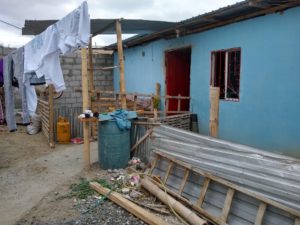
Outside the home of Elena Velez.
Elena Velez is a connector, a fixer and a force. She blasts into rooms, talking, planning, hugging, corralling, filling every corner with her presence. With a personality that more than compensates for her short stature, the 63-year-old has the energy of a child, the compassion of a saint and a bark fiercer than her two beloved dogs.
Through OMPE, she organizes workshops so that women who have lost their bread-winning husbands can learn new economic skills. She rides the public bus to cities hours away to urge officials to take action against the disappearances. Every day she receives up to a dozen calls from men imprisoned in the United States, asking for help or answers.
Elena’s home is made of cinderblock, which means she is one of the lucky ones, though the rooms are still separated by curtains; doors are a luxury in this neighborhood. She convened the meeting between me and the other women in her living room, and sat, stood, paced, exclaimed and answered phone calls from men in prison throughout.
I first asked the women about life before their loved ones’ capture. Maria Chavez Cedeno, whose face, at 69, is weathered from hardship and poverty, told me that her son Vicente made $50 to $100 per fishing trip, which would typically last 15-25 days. Often, he made nothing.
“Sometimes [he] came home from fishing without even money to wash his dirty fishing clothes,” she said. In 2016, the US Coast Guard picked up Vicente with cocaine in his boat. He is now serving 10 years at a private prison in Pennsylvania.
Bexy Guerrero lives in a cane-slat house with a dirt floor and no plumbing. When I asked how she survived with five children and her husband gone, she replied, “Sometimes I eat and sometimes I don’t.”
Drug smuggling trips, called vueltas, can earn fishermen $10,000 to $30,000 per trip—life-changing sums.
The per capita income for fishermen in this area is $132 a month. According to the women, drug smuggling trips, called vueltas, can earn fishermen $10,000 to $30,000 per trip—life-changing sums that may enable them to move their family to a gated-community home in Manta, put kids in private school, start a business or move to a wealthier region.
Shirley Salto Cedeno, 27, whose husband Emiliano is serving time at a private prison in Georgia, said that Emiliano wanted to take the risk to provide for their three children. Before he left, the couple had argued. Shirley thought the trip was too dangerous.
“Just one vuelta,” Emiliano had pleaded with her. “Then we can build a new life.”
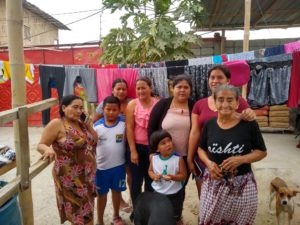
Women and children in Manta. This group includes Elena (far left), Bexy (in pink), Shirley (to Bexy’s right) and Maria (far right).
According to the people I interviewed, “Just one vuelta,” could be the motto for poor families in Manta. Nearly every fisherman has been offered the chance to make a drug run. Local fixers, typically with connections to Colombian smugglers, offer rewards to those willing to smuggle cocaine up the Pacific coast to Mexico or California.
Many fishermen, knowing the risks of smuggling, refuse to take vueltas. But catastrophe can push them to reconsider.
Of those who agree, many succeed. Hungry neighbors watch while the successful fishermen move from crowded, dirt-floor apartments to large, cinder-block houses with amenities like internet. Some throw neighborhood block parties with free drinks for all, which attracts the attention of police and can lead to dire consequences.
“Everybody knows where the money came from,” said Shirley, the sassiest member of the group. “Drug money is Manta’s dirty secret.”
Many fishermen, knowing the risks of smuggling, refuse to take vueltas. But catastrophe can push them to reconsider. Nearly half of the families I interviewed said their loved one had made a vuelta in 2016—the year a magnitude 7.8 earthquake leveled Ecuador’s coast, leaving thousands of families homeless.
Shirley’s husband, Emiliano, took a vuelta after the couple lost their home to the earthquake. A US Coast Guard helicopter flying over the ocean spotted his boat and shot the motor so he couldn’t escape. After being captured, Emiliano spent two months aboard the ship, detained without a lawyer or a trial, held in legal suspension until the ship finished patrolling the Central American coast and deposited the men in Florida.
Most foreigners picked up at sea are prosecuted in Florida. Geographically, this makes little sense because Florida is much further from the Pacific ocean than western US states, and getting there requires more time and resources. But the Ninth Circuit federal judicial district, which covers the western United States, mandates that prosecutors prove that smugglers were destined for the US in order to convict them. The Eleventh Circuit, which covers Florida, requires no such proof. Thus, Florida is the preferred state for prosecuting drug smugglers.
Her youngest child, a two-year-old, stopped speaking after his father disappeared.
Among the women I interviewed, their men’s sentences range from nine to 14 years. Their absence is both financially and emotionally devastating to the families they leave behind. Several women struggle to talk through tears.
One woman, who had given birth to a daughter only days before her husband’s capture, was so distraught that she couldn’t care for the child and had to send her to relatives. Another tells me her youngest child, a two-year-old, stopped speaking after his father disappeared.
When all the women had told their stories and gone home, Elena Velez and I were left alone. While I interviewed the other women, Elena had been a pillar of strength and encouragement as she bustled about tending to their needs. But once we were alone and it was Elena’s turn to talk, I saw a different side of her.
Elena’s son Johony was captured in 2016, the year before she founded OMPE. Like many, he took a vuelta after Elena lost her home in the earthquake. She has never forgiven herself for the fact that Johony made the trip to buy her a new home.
She showed me drawings and letters he wrote to her, in which he begs forgiveness for the suffering he has caused.
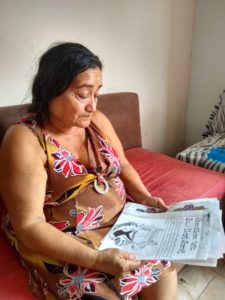
Elena with Johony’s letters.
At times she seemed angry with him for taking this risk without telling her. Other times, grief took over, her tough veneer cracked and she started to cry. Mostly, she looked tired. “He would come home and open the fridge and say, ‘Mom, what happened in the fridge. Did poverty visit?’ Then he would take me out to buy vegetables and shampoo.”
As we talked and I saw the pain of a parent’s loss etched onto her face, I was reminded of the parents in the United States who have also lost a child, sometimes involving the very drugs that these fishermen were attempting to deliver (particularly if fentanyl is introduced later in the supply chain). I wondered if the captures are making any difference to those families.
Has Operation Martillo succeeded in slowing the flow of cocaine into the United States? Is the $8 million the US spends each year to arrest foreign nationals at sea—and the millions more we spend to incarcerate them—having any impact at all?
Since Operation Martillo began, the total tonnage of cocaine smuggled into the US by sea has more than quadrupled.
Years of covering drug policy have taught me that supply-side interventions rarely succeed in reducing drug availability or use. Nevertheless, I scoured the US Coast Guard archives for information on the impact of Operation Martillo.
Before 2012, the year Operation Martillo began, the US Coast Guard was detaining around 200 suspected smugglers per year in international waters. It was intercepting around 80 tons of cocaine annually, or an estimated 12 percent of the total amount of cocaine suspected to enter the United States via the Pacific ocean.
After 2012, the number of foreigners captured at sea tripled. The US Coast Guard now intercepts about 200 metric tons of cocaine per year. Yet this amount represents only 7.3 percent of the cocaine trafficked in the US from the Pacific, because since Operation Martillo began, the total tonnage of cocaine smuggled into the US by sea has more than quadrupled.
There is a simple economic explanation for this. With the increased risk of being caught, traffickers will offer more money to fishermen who attempt a vuelta, and thus more fishermen will go. All along the Pacific coast, from Ecuador to El Salvador to Guatemala to Mexico, there is no shortage of people desperate to escape poverty and violence by any means possible. To the real profiteers—who would never be so foolish as to smuggle drugs themselves—poor fishermen are plentiful and expendable.
Ironically, much of the poverty and violence that drives people to take vueltas results from the United States’ own policies. Our international trade agreements put millions of farmers out of business and our drug war tactics increase profitability for cartels, which leads to violence amongst rivals jostling for power. We are also the world’s largest per capita consumer of illicit drugs, yet we punish others for satisfying our appetite.
Poor fishermen and their families are collateral damage in the drug war. Their suffering is a win for the cartels, who succeed in smuggling 93 percent of their drugs into the United States while sacrificing only a few hundred disposable fishermen. Their capture is a win for the Coast Guard, which can request more funding to detain “narco-traffickers” while filling their boats with the poor.
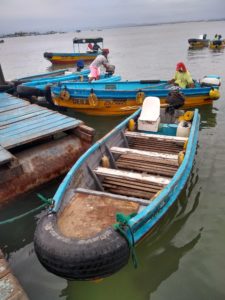
Fishermen in Manta preparing to leave port.
For people like Elena Velez, the profiteering and power-play that exist on an international level have real consequences.
“Some days I want to give up,” she admits. “But then I look around at the faces of the other women and I know I have to keep going.”
All photographs by Tessie Castillo.
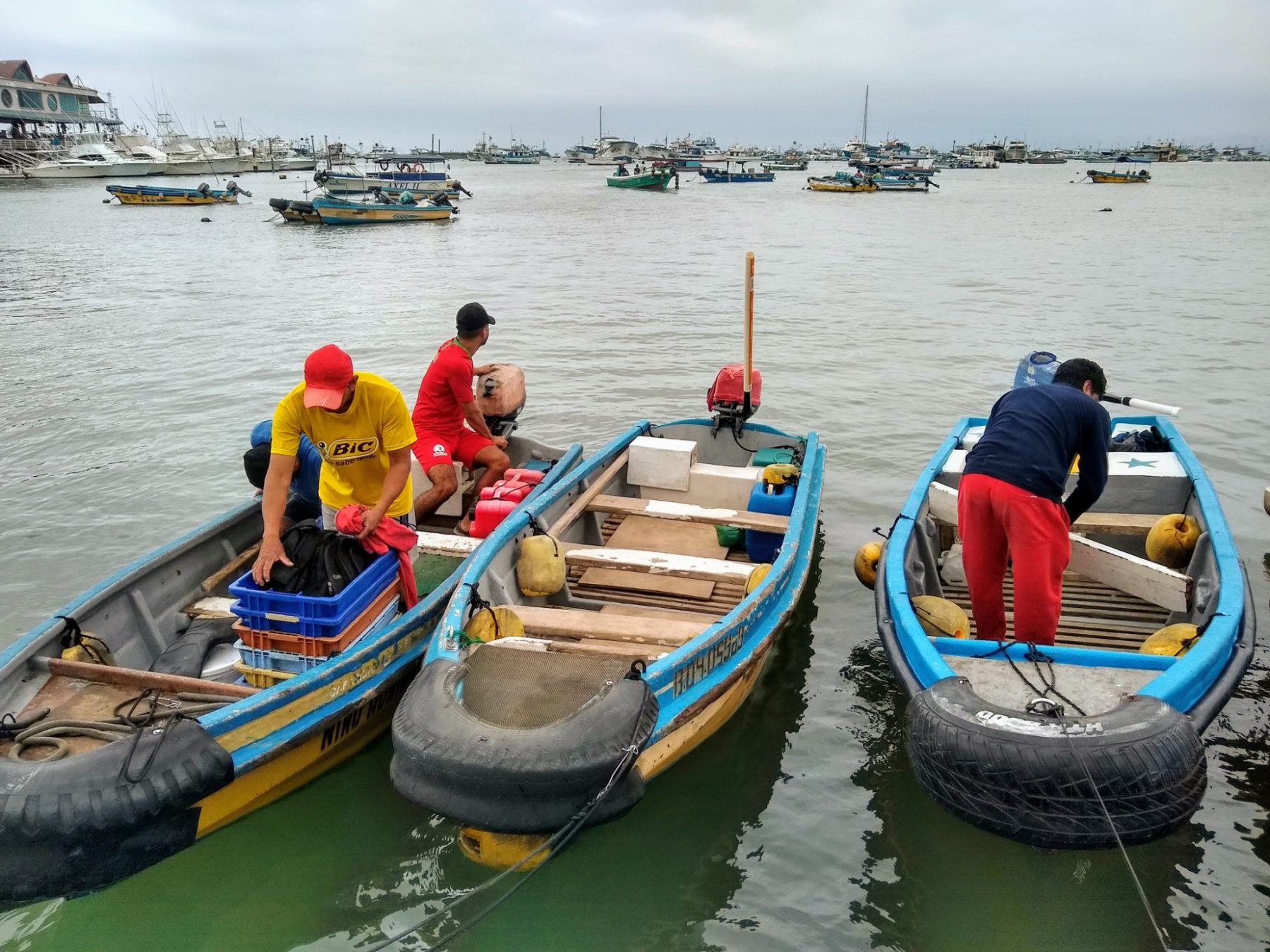




Show Comments